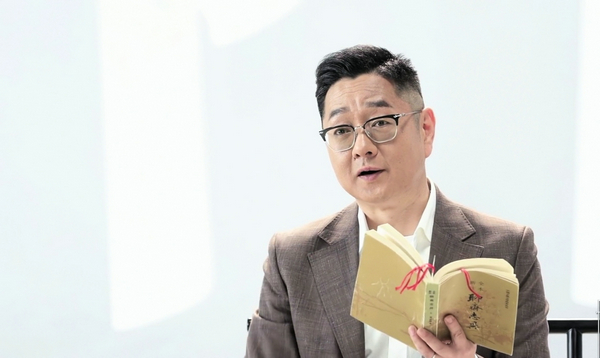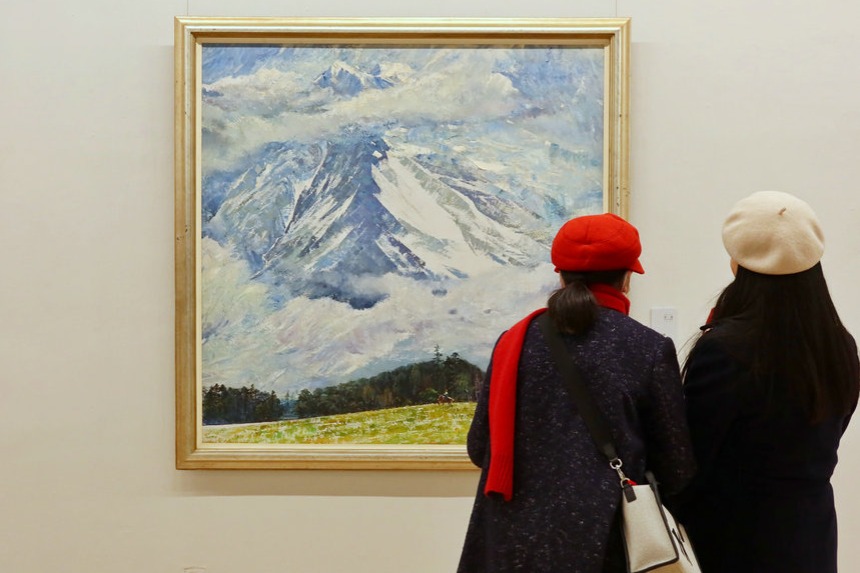Ancient fables, modern lessons for younger readers


In each episode of the program, Zhang reads a story, usually a lesser-known one from the book, and explains its original text of wenyanwen, the written form of classical Chinese-the literary language used in ancient China-into simpler colloquial expressions. He will then mix his insight into the story, put it into a modern context and see how it can inspire young people to handle difficulties in life.
For example, in the first episode The Woman in Green, which tells a story of how a young woman, who is actually a bee spirit, falls in love with a man but finally leaves him without hesitation. She feels unsafe after the man keeps praising her voice and urging her to sing.
"In a modern, urban romance, people often ask their partners to do something on the excuse of love despite the fact that their partners may not want to," Zhang says in the program. "This story may easily trigger people's emotional resonance."
When the woman flees as a bee, she only leaves a word of "thanks" to the man. Zhang explains: "She thanks the man for the beautiful days of love, and the chance for her to be her true self. How many people in life can break up with their partner in such a decisive but elegant way? When a modern couple attack each other upon breaking up, things can be really nasty."
In the last episode of the show, he tells the story of a man who goes through life doing little or no work after his father promises to bequeath him a vast fortune. However, when he finally gets the windfall, it is too late to enjoy his newfound wealth and he has wasted his life in pursuit of it. Zhang asks: "Why did he base his future on an unreliable promise instead of seizing the day and building a good life of his own?"
Zhang admits that he has read the book many times. "I began to love reading Liaozhai Zhiyi as a child, and as I age I read the stories again and again. Each time I've nurtured new feelings."
The program has so far achieved 8.4 points out of a total 10 on Douban, a leading film and TV review platform, but being highly acclaimed does not mean that there is an absence of criticism.
Although Zhang has referred to Ma Ruifang, a professor at Shandong University who is a top-level scholar specializing in the classic fiction, to avoid mistakes when he explains the original texts, many viewers left comments online voicing their different understandings of the stories' connotations.
They also corrected Zhang's pronunciation of certain words because a character often has different pronunciations based on the contexts in wenyanwen.
"I never expected my version to be regarded as the only true answer. It'll be great if people get inspired through the program and have their own ideas," Zhang says and smiles. He used to host a program on reading when he worked at China Central Television, but he recalls that the program met with a tepid response. Hardly surprising as it was broadcast at 3 am and was finally dropped because of low ratings.
One program may not lead to a revival of programs on reading, Zhang says, but "at least I think it's a great way to usher people to wenyanwen and to enjoy the beauty of words".
Upcoming seasons of the program may cover Shiji, the monumental historical recording written by historian Sima Qian during the Western Han Dynasty (206 BC-AD 24).
"Ancient authors can only tell stories based on the social atmosphere of their own time," Zhang says. "However, their inspiration can be everlasting because human nature largely remains unchanged."
wangkaihao@chinadaily.com.cn
- A tribute to Pete Hamill, legendary New York writer
- Hit series 'Joy of Life' takes home two Shanghai TV Festival awards
- Film festival commemorates China-Nepal relations milestone
- China concludes international film festival amid market recovery
- Digital age of restoration gives TV viewers a chance to reflect





































